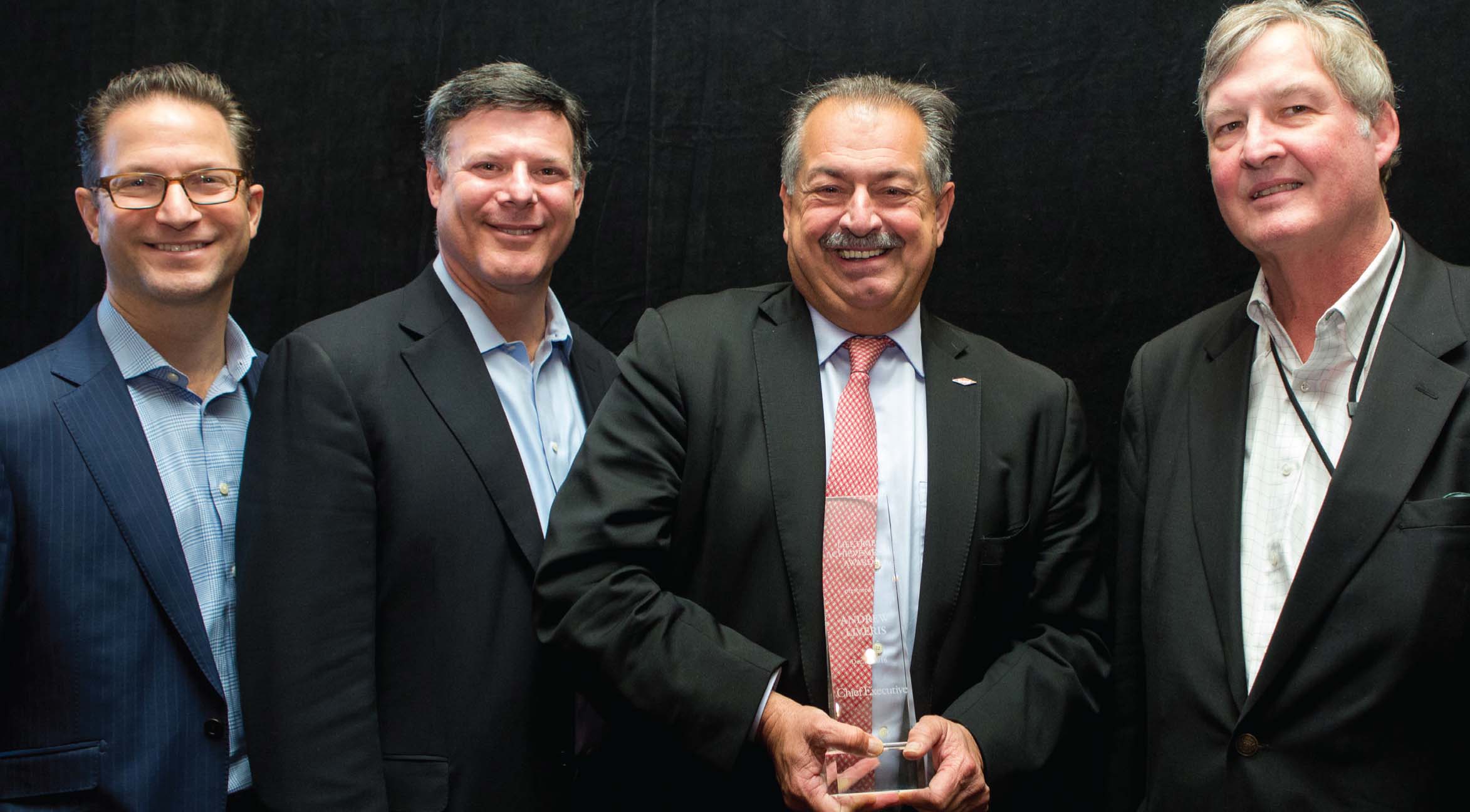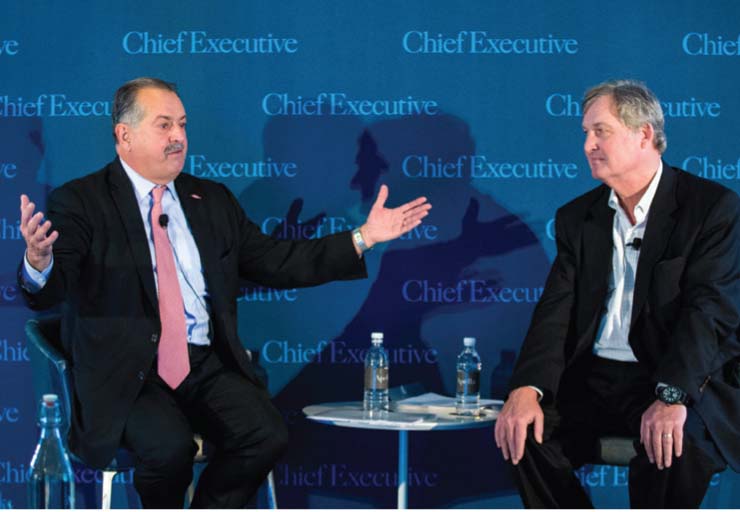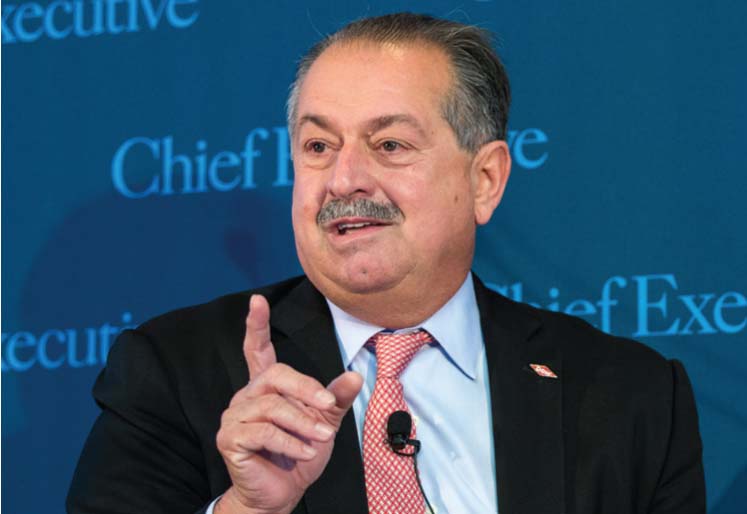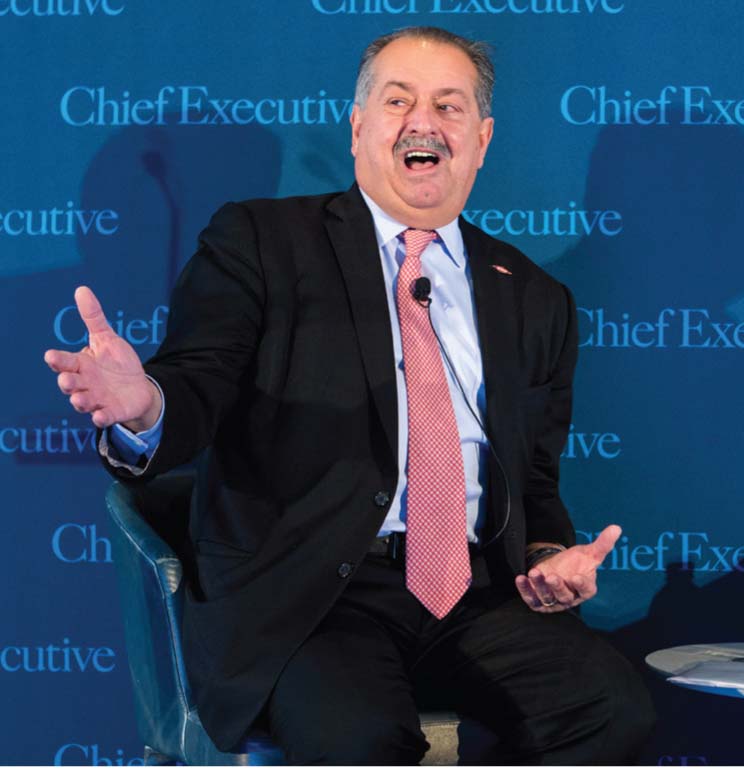
At the December 2016 Digital Transformation Summit event in New York City, Dow Chemical’s Andrew Liveris received Chief Executive’s 2016 Lifetime Achievement Award in recognition of his successful transformation of a 120-year-old company. From the presentation, Liveris headed uptown to meet with then president-elect Donald Trump, who approached him to head a manufacturing council for the new administration. As we know now, Liveris accepted and heads up the council.
Following are excerpts from a conversation Liveris had earlier that day with J.P. Donlon, Chief Executive’s editor-in-chief emeritus, in which Australian-born Liveris described how he transformed his company over the four decades he has been with Dow and commented on broader social and political issues.
 ON DOW’S TRANSITION FROM BEING A BASIC CHEMICAL COMPANY TO A MUCH HIGHER VALUE-ADDED INTERNET-CONNECTED PROFILE: “There have been two pillars of Dow’s digital transformation. The most important is the people piece. And the other is the systems and processes piece. They are interrelated. We came to recognize that culture was the seminal piece.
ON DOW’S TRANSITION FROM BEING A BASIC CHEMICAL COMPANY TO A MUCH HIGHER VALUE-ADDED INTERNET-CONNECTED PROFILE: “There have been two pillars of Dow’s digital transformation. The most important is the people piece. And the other is the systems and processes piece. They are interrelated. We came to recognize that culture was the seminal piece.
“We are a very process-driven company. We’re all engineers. We have processes and rules. We were quite successful in the end-to-end transformation from a systems point of view.”
 ON TRANSFORMING THE WORKFORCE: The company faced a basic decision to “rewire or rehire” its people, Liveris said. “Not much of our workforce could be rewired to change the way they worked. A lot of people were not willing to reinvent themselves, which is why today, out of 55,000 employees, about 25,000 have been with the company for less than five years. We had to learn from the people we hired to become more agile with our rules. Leadership is an oxymoron. You are constantly in a tug of war between two critical sets of rules. One set of rules is controls and processes. The other is the imperative to innovate.”
ON TRANSFORMING THE WORKFORCE: The company faced a basic decision to “rewire or rehire” its people, Liveris said. “Not much of our workforce could be rewired to change the way they worked. A lot of people were not willing to reinvent themselves, which is why today, out of 55,000 employees, about 25,000 have been with the company for less than five years. We had to learn from the people we hired to become more agile with our rules. Leadership is an oxymoron. You are constantly in a tug of war between two critical sets of rules. One set of rules is controls and processes. The other is the imperative to innovate.”
 ON THE AMERICAN EDUCATIONAL SYSTEM: “We have a 19th century education system and the workforce is skewed into two directions: at the high end, you have people with Ph.D.s and then you have people who drop out of high schools. That big piece in the middle is where we have to upskill to modern technologies and infrastructure. We need to rebuild the public education system around the needs of this new workforce.”
ON THE AMERICAN EDUCATIONAL SYSTEM: “We have a 19th century education system and the workforce is skewed into two directions: at the high end, you have people with Ph.D.s and then you have people who drop out of high schools. That big piece in the middle is where we have to upskill to modern technologies and infrastructure. We need to rebuild the public education system around the needs of this new workforce.”
ON INCOME INEQUALITY: “Income inequality is a huge issue, along with youth unemployment and reskilling. I don’t think the undergraduate college degree does much anymore. It’s about what the high school degree did 10 or 15 years ago.”
ON WHY HE SPENDS 200 TO 250 DAYS TRAVELING THE GLOBE: “You have to be inclusive. The only thing you have discretion over is your time. Inclusiveness means I choose to give you time. I value our relationship. I value you as a customer or a partner or an employee. In some ways, I am a chief relationship officer or a chief people officer.”
ON THE KEY TO BEING A CEO: “You have to know at all times where your North Star is. Where are you going? What is your purpose? Do you live it? Are you passionate about it? Are you the high priest of it? We are not teaching that at MBA schools.”
 ON MAINTAINING A PERSONAL TOUCH: “When someone is down, be the first to call them, for whatever the reason. I think we are human. Nothing will replace that. Look people in the eyes, sit down, break bread, do the things we were built to do. Machines will never do those things.”
ON MAINTAINING A PERSONAL TOUCH: “When someone is down, be the first to call them, for whatever the reason. I think we are human. Nothing will replace that. Look people in the eyes, sit down, break bread, do the things we were built to do. Machines will never do those things.”
ON THE NEW TRUMP ADMINISTRATION: “I am pro-USA. I’m not a U.S. citizen so I can’t vote. But whoever is in charge, we’re going to work to make everything better. That’s America. I, for one, and Dow will be there to help.”
Chief Executive Group exists to improve the performance of U.S. CEOs, senior executives and public-company directors, helping you grow your companies, build your communities and strengthen society. Learn more at chiefexecutivegroup.com.
0

1:00 - 5:00 pm
Over 70% of Executives Surveyed Agree: Many Strategic Planning Efforts Lack Systematic Approach Tips for Enhancing Your Strategic Planning Process
Executives expressed frustration with their current strategic planning process. Issues include:
Steve Rutan and Denise Harrison have put together an afternoon workshop that will provide the tools you need to address these concerns. They have worked with hundreds of executives to develop a systematic approach that will enable your team to make better decisions during strategic planning. Steve and Denise will walk you through exercises for prioritizing your lists and steps that will reset and reinvigorate your process. This will be a hands-on workshop that will enable you to think about your business as you use the tools that are being presented. If you are ready for a Strategic Planning tune-up, select this workshop in your registration form. The additional fee of $695 will be added to your total.

2:00 - 5:00 pm
Female leaders face the same issues all leaders do, but they often face additional challenges too. In this peer session, we will facilitate a discussion of best practices and how to overcome common barriers to help women leaders be more effective within and outside their organizations.
Limited space available.

10:30 - 5:00 pm
General’s Retreat at Hermitage Golf Course
Sponsored by UBS
General’s Retreat, built in 1986 with architect Gary Roger Baird, has been voted the “Best Golf Course in Nashville” and is a “must play” when visiting the Nashville, Tennessee area. With the beautiful setting along the Cumberland River, golfers of all capabilities will thoroughly enjoy the golf, scenery and hospitality.
The golf outing fee includes transportation to and from the hotel, greens/cart fees, use of practice facilities, and boxed lunch. The bus will leave the hotel at 10:30 am for a noon shotgun start and return to the hotel after the cocktail reception following the completion of the round.